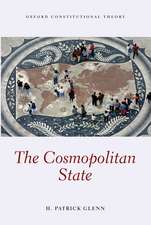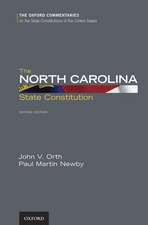Civil Society and Memory in Postwar Germany
Autor Jenny Wüstenbergen Limba Engleză Hardback – 6 sep 2017
| Toate formatele și edițiile | Preț | Express |
|---|---|---|
| Paperback (1) | 320.17 lei 6-8 săpt. | |
| Cambridge University Press – 19 dec 2018 | 320.17 lei 6-8 săpt. | |
| Hardback (1) | 731.47 lei 3-5 săpt. | +28.88 lei 7-13 zile |
| Cambridge University Press – 6 sep 2017 | 731.47 lei 3-5 săpt. | +28.88 lei 7-13 zile |
Preț: 731.47 lei
Preț vechi: 803.82 lei
-9% Nou
Puncte Express: 1097
Preț estimativ în valută:
139.96€ • 146.53$ • 115.81£
139.96€ • 146.53$ • 115.81£
Carte disponibilă
Livrare economică 15-29 martie
Livrare express 01-07 martie pentru 38.87 lei
Preluare comenzi: 021 569.72.76
Specificații
ISBN-13: 9781107177468
ISBN-10: 1107177464
Pagini: 352
Ilustrații: 36 b/w illus.
Dimensiuni: 157 x 235 x 20 mm
Greutate: 0.69 kg
Editura: Cambridge University Press
Colecția Cambridge University Press
Locul publicării:New York, United States
ISBN-10: 1107177464
Pagini: 352
Ilustrații: 36 b/w illus.
Dimensiuni: 157 x 235 x 20 mm
Greutate: 0.69 kg
Editura: Cambridge University Press
Colecția Cambridge University Press
Locul publicării:New York, United States
Cuprins
List of illustrations; Preface; Acknowledgements; Abbreviations and German terms; 1. Civil society activism, memory politics and democracy; 2. Memorial politics and civil society since 1945; 3. Building negative memory: civic initiatives for memorials to Nazi terror; 4. Dig where you stand: the History Movement and grassroots memorialization; 5. Memorial aesthetics and the memory movements of the 1980s; 6. A part of history that continues to smolder: remembering East Germany from below; 7. Hybrid memorial institutions and democratic memory; Interviews; Bibliography; Index.
Recenzii
'Emphasizing the role of memory activists in civil society - and their entanglement with state institutions and actors - Jenny Wüstenberg makes a compelling case for the force of contentious memories in reshaping the landscape of democratic remembrance. Her bottom-up approach brings memory agency to the fore and provides a necessary new perspective on a history we thought we already knew: the development of the public memory of National Socialism, the Holocaust, and communist repression in the postwar Federal Republic of Germany. Civil Society and Memory in Postwar Germany is important reading for all scholars in memory studies, Holocaust studies, and German studies.' Michael Rothberg, author of Multidirectional Memory: Remembering the Holocaust in the Age of Decolonization
'Where does memory come from, and where does it take place? In contrast to conventional approaches that emphasize either the state as a producer of memory or the private sphere as the location of non-state memory, Jenny Wüstenberg's important book highlights the neglected role of memory activists. This book is a truly significant contribution to the literature, both about Germany and about memory politics, providing nuanced interpretations and novel theoretical insights. A major accomplishment!' Jeffrey Olick, University of Virginia
'This absorbing and carefully researched book has clearly been a labour of love for its author. It will be of interest to students and researchers in an array of disciplines, including History, Sociology, Politics, Museum Studies, Geography, German Studies and Cultural Studies. As we approach the 30th anniversary of the fall of the Berlin Wall, Wustenberg's fascinating research on memory activists is a timely reminder of the importance for our contemporary society of confronting and memorializing difficult pasts.' Deirdre Byrnes, European History Quarterly
'Where does memory come from, and where does it take place? In contrast to conventional approaches that emphasize either the state as a producer of memory or the private sphere as the location of non-state memory, Jenny Wüstenberg's important book highlights the neglected role of memory activists. This book is a truly significant contribution to the literature, both about Germany and about memory politics, providing nuanced interpretations and novel theoretical insights. A major accomplishment!' Jeffrey Olick, University of Virginia
'This absorbing and carefully researched book has clearly been a labour of love for its author. It will be of interest to students and researchers in an array of disciplines, including History, Sociology, Politics, Museum Studies, Geography, German Studies and Cultural Studies. As we approach the 30th anniversary of the fall of the Berlin Wall, Wustenberg's fascinating research on memory activists is a timely reminder of the importance for our contemporary society of confronting and memorializing difficult pasts.' Deirdre Byrnes, European History Quarterly
Notă biografică
Descriere
This book analyzes postwar Germany to show how social movements shape public memory and influence democratization through cooperation and conflict with government.

















